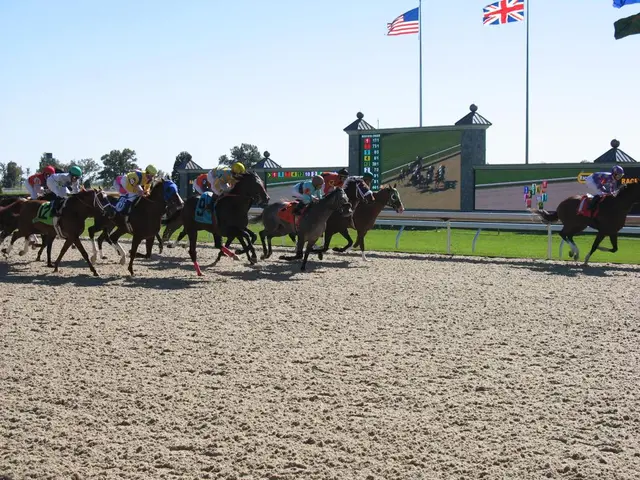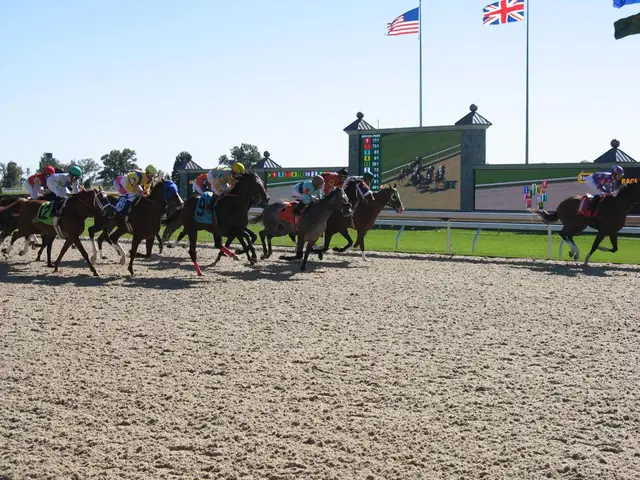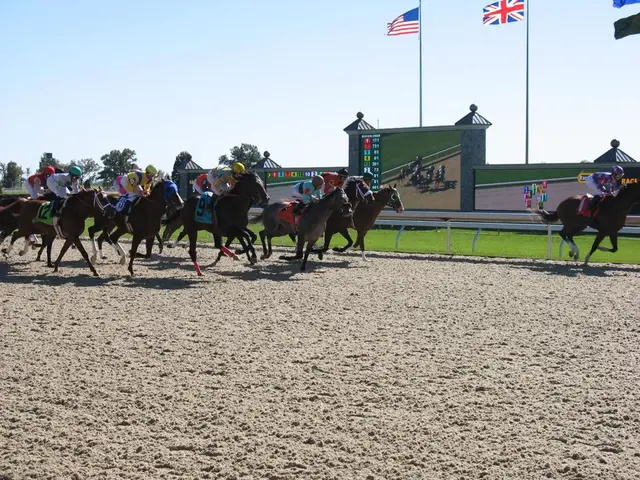Ban on Danny Brock for 15 Years Issued by BHA (British Horseracing Authority)
Brock's 15-Year Ban: A Stinging Blow to Racing Fraud
Brock's racing career has taken a dramatic turn, with a 15-year ban looming over his head. This harsh punishment, a career-ender, is the result of Brock's intentional race-fixing activities, as exposed during an investigation.
Cleaning up Horse Racing: Weeding out the Rot
Brock, it appears, deliberately hampered his horses during races or even stopped them outright, engaging in fraudulent practices that jeopardize the very essence of the sport. The British Horseracing Authority (BHA) has brought charges against Brock, covering offenses stretching from December 2018 to March 2019.
In a statement, the BHA expressed its approval of the Integrity Committee's decision, emphasizing that such dishonorable conduct cannot be tolerated in British horse racing. The authority added, "This behavior risks undermining public trust in our sport and disrespects the hard work and dedication of countless individuals who serve with integrity."
The BHA also revealed that Brock's close associates have illicitly profited from the match-fixing schemes, compromising the integrity of racing. To quell the chaos and restore public faith in the sport, the BHA has deemed a severe penalty unavoidable.
"It's crucial that all competitors feel certain they compete on a fair playing field," the BHA stated, expressing gratitude to the panel tasked with uncovering the facts and making tough calls.
When Dishonesty Meets Consequences: Zero Tolerance for Corruption
Corruption in sport isn't new; many sports are on the offensive against illicit manipulation of events. The World Snooker Tour, for example, recently suspended two players to make a strong statement about intolerance towards suspicious activities. The International Tennis Integrity Agency (ITIA) has also taken action on several cases recently.
The Global Fight Against Match-Fixing: Collaboration is Key
Worldwide sports authorities are adopting multi-faceted strategies to combat match-fixing. Their efforts span collaboration with international bodies, regulatory frameworks, technological innovation, education, and engagement of stakeholders.
Notably, the International Olympic Committee (IOC) is sharing anti-match-fixing information with various sports federations under the Olympic Movement Unit on the prevention of the manipulation of competitions (OM Unit PMC). Governments are also joining forces with international bodies like the Council of Europe to bolster their efforts against match-fixing.
Endemic countries like Norway and Brazil are taking decisive action, forging partnerships with technology leaders, financial authorities, and other sectors to shore up regulatory oversight. Technological solutions like Sportradar's Universal Fraud Detection System (UFDS) are playing a pivotal role in identifying and combating suspicious activities.
Awareness and education initiatives are also integral to the global fight against corruption. Regular training programs are being developed for sports officials and coaches, while public campaigns are being launched to enlighten the masses about the risks of match-fixing.
Lastly, reporting mechanisms are being bolstered, with sports bodies, betting operators, and law enforcement agencies collaborating to share vital intelligence and take swift action against potential manipulation attempts.
In the end, the message is clear: no form of corruption goes unnoticed, and those involved can expect a rigorous response from sports authorities worldwide.
- The British Horseracing Authority (BHA) has also initiated measures against corruption in sports, focusing on illicit sports betting, as seen in the case of Brock who was banned from horse racing for 15 years due to his match-fixing activities.
- Expanding the fight against match-fixing, the International Tennis Integrity Agency (ITIA) has taken action on several cases, similar to the World Snooker Tour's suspension of two players to demonstrate a zero-tolerance policy towards corruption in sports.
- To curb match-fixing in horse racing, technological solutions like Sportradar's Universal Fraud Detection System (UFDS) are key, as countries like Norway and Brazil are partnering with technology leaders and financial authorities to bolster regulatory oversight in their fight against corruption.








